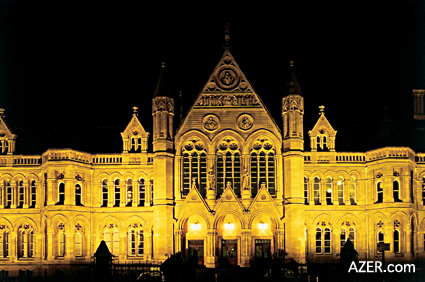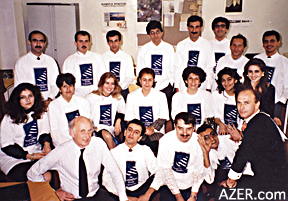|

Spring 2002 (10.1)
Pages
50-51
Nottingham Trent University
Providing
Educational Support for Azerbaijani Students
by Colin Love
  I'll never forget those first impressions
of Baku. It was 1993, and I along with three other colleagues
from The Nottingham Trent University were among the passengers
peering out the windows of British Petroleum's privately chartered
executive jet as it circled Baku, preparing to land. The immediate
landscape looked far from inviting - flat, dirty ochre in color,
littered with derelict buildings. Upon landing, things didn't
appear much better. The airport was cold and dismal. We soon
realized that our arrival at an international airport was not
the usual kind. Processing our documents seemed to take forever.
Eventually, we were met and driven to the bleak, cold and shabby
Moskva Hotel overlooking the city. My colleagues and I looked
at each other, wondering, what we were getting ourselves into?
Ten years later, I can say it's been one of the most rewarding
experiences in the history of our university. I'll never forget those first impressions
of Baku. It was 1993, and I along with three other colleagues
from The Nottingham Trent University were among the passengers
peering out the windows of British Petroleum's privately chartered
executive jet as it circled Baku, preparing to land. The immediate
landscape looked far from inviting - flat, dirty ochre in color,
littered with derelict buildings. Upon landing, things didn't
appear much better. The airport was cold and dismal. We soon
realized that our arrival at an international airport was not
the usual kind. Processing our documents seemed to take forever.
Eventually, we were met and driven to the bleak, cold and shabby
Moskva Hotel overlooking the city. My colleagues and I looked
at each other, wondering, what we were getting ourselves into?
Ten years later, I can say it's been one of the most rewarding
experiences in the history of our university.
Management Courses
From the onset of the break-up of the Soviet bloc, our university
had made a conscious commitment to get involved with the challenges
of training and educating "New Europe", including the
former Soviet Union. Prior to that trip to Azerbaijan, we were
already involved with universities in Poland, Czechoslovakia
and Uzbekistan. No doubt it was this successful track record
that had led to our being awarded a three-year contract to teach
management in Baku.
  Left: Nottingham Trent University, shown above, has
been providing support for Azerbaijani education since 1993. Left: Nottingham Trent University, shown above, has
been providing support for Azerbaijani education since 1993.
During those first three
years, some 60 Azerbaijani managers (under the sponsorship of
BP) received training from our staff at the British Council,
which at that time was located in the Institute of Politology
building (previously, the Communist Party Training School). Upon
completion of their courses, the managers were awarded the fully
accredited postgraduate Certificate in Management. Six students
were awarded extended sponsorship to continue their management
studies with us in the U.K.
It's exciting to hear these days how so many of these students
have developed careers and are now holding senior management
positions in Azerbaijan. Even after all these years when they
get back together, they joke about how certain letters of the
alphabet came to have new significance for them. "A"
was for Assignments - coursework that had to be submitted by
"D"-dreaded Deadlines for submission! But most significantly,
they remember the learning process - the interactive group work,
the problem-centered approach to subjects such as Meeting Customer
Needs, Managing Finance or Managing People. It was all a very
different learning experience from what they had been taught
under the Soviet system.
  Adjusting to Baku Adjusting to Baku
Despite our initial impressions of the city, it took less than
a day for us to realize that Baku was an exceptional city.
Left:
Numerous academic staff
from Azerbaijan have benefitted from training programs provided
by the U.K.'s Nottingham Trent University.
The architecture was
fascinating and the people we met were unbelievably friendly
and welcoming.
Nonetheless, during those early days, we faced so many obstacles,
especially related to our living arrangements - temperamental
gas water heaters and an unpredictable water supply, for starters.
Many of our basic requirements, from sugar to toilet rolls, were
hard to find. During those years, there were the curfews at night
and tanks on the streets. How well I recall the tears in one
student's eyes as he helped me carry my luggage from the Old
Intourist Hotel when, fearing an insurrection, the British in
Baku decided to evacuate to Moscow. "Would we ever come
back," he asked? We did. Four months later we were "back
in town," and the course resumed.
Partnering with
Schools
Since then, our university staff has been working on an extensive
range of educational projects in Azerbaijan. We were awarded
a European Union TACIS [Technical Assistance of the European
Community to the CIS countries] "Training the Trainers Program"
to assist in a development program for Public Administrators.
In addition to enhancing library and IT facilities, our staff
at the Institute for Public Administration enabled 30 Azerbaijanis
to train in the design and delivery of new courses appropriate
to the changing role of public administration.
These included, for example, Financial Management, Fiscal Policy,
Human Resource Development and Social Security Systems. During
this two-year training process, each of the Azerbaijani trainers
also studied for a Nottingham Trent postgraduate Certificate
in Public Administration Management; a total of 26 were awarded.
Yet another TACIS-funded project has enabled us to assist the
private Khazar University in developing its internal processes
of Academic Quality Assurance.
Currently, with the support of British government funding, we
are assisting Western University staff in developing "best
practice" in the design and delivery of undergraduate and
postgraduate courses in Finance and Financial Services.
This means that Western University students are already benefiting
from redesigned courses appropriate to the changing nature of
Azerbaijan's financial markets and institutions. The students
are also experiencing upgraded teaching and learning methods,
including case studies. Upon graduating, each student will be
better equipped to make a contribution to the development of
the country's economic growth.
Over the course of these years, nearly 50 Azerbaijani academic
staff members have come to Nottingham Trent to study how we do
things here and have access to all of our university's educational
support facilities.
Warm Hospitality
During these years, there have been so many opportunities for
us to become familiar with Azerbaijani culture, especially music.
Attending a performance of Hajibeyov's "Leyli and Majnun"
is an unforgettable experience - especially with the compelling
sounds of the Azerbaijani instruments, of which the tar has become
my favorite.
How we've enjoyed the hospitality of Azerbaijani families and
generosity - tables spread with delicious food. I'll never forget
the first time I found a lady by my side peeling an apple for
me. "But in Azerbaijan we do this for guests," she
explained. "Unfortunately, not in England!" I thought
to myself.
Of course, it's a special honor to be invited to an Azerbaijani
wedding - with all that dancing. Just stretch out your arms,
shuffle your feet energetically and keep moving. How simple it
looks, until you see yourself on video!
Student-Centered
Learning
Over the past ten years there has been a regular stream of Azerbaijani
students coming to Nottingham Business School and our Language
Center - some for short intensive language courses, others for
up to three years of undergraduate or postgraduate study.
As Business School graduate Nigar Gasimova recalled, "We
were a long way from home, in a different social environment
and, most significantly, in a different educational culture.
But the teachers did their best to help us by stressing the priority
of student learning rather than teachers teaching. We were encouraged
to understand that, as students, we are candles to be lit, not
bottles to be filled."
This emphasis on student-centered learning was the focus of considerable
interest when, in May 2001, we received a visit from the Azerbaijan
Minister of Education, Professor Misir Mardanov, and Professor
Mubariz Yusifov, the Rector of Ganja State University. Their
visit led to the signing of a Memorandum of Cooperation between
our two universities that, subject to funding, will provide opportunities
for collaboration in developing an English Language Center in
Ganja, teacher training in Nottingham and joint research activities.
A World of Change
That initial flight to Baku seems so long ago and far away. Many
things have changed in Azerbaijan since then. There's a beautiful,
clean, new airport building welcoming visitors. Basic commodities
and even luxuries are readily available in the shops - for a
price. Streets are much cleaner. Street vending, which had been
a vibrant, and perhaps essential, part of the economy, has been
largely swept away (though not without controversy).
Now there is a constant flow of water in public parks and fountains
- even if water doesn't always flow in apartments. Manufacturing
and service industries are developing. The promised oil and gas
is beginning to flow.
Already a new generation of university students coming of age
don't even remember what life was like before the existence of
the omnipresent mobile phone. As teachers, we have to remind
ourselves that many of our students were only seven years old
when Azerbaijan gained its independence.
Azerbaijan's economy relies on providing high-quality education
and training. At Nottingham Trent, we hope we can continue to
play a significant role in this. Our enthusiasm is rooted in
the positive memories and tangible results that we have experienced
since that first visit nearly a decade ago. Our ties are close,
so close that if Baku can boast its own Shakespeare Pub, maybe
we should start thinking about opening a Nizami Chai Khana (Teahouse)
here in Nottingham.
Colin Love is the Central and
Eastern Europe Academic Projects Coordinator for The Nottingham
Trent University in the U.K. Contact: colin.love@
ntu.ac.uk; www.ntu.ac.uk.
____
Back to Index
AI 10.1 (Spring 2002)
AI Home
| Magazine
Choice
| Topics
| AI Store | Contact us
Other Web sites
created by Azerbaijan International
AZgallery.org | AZERI.org | HAJIBEYOV.com
|